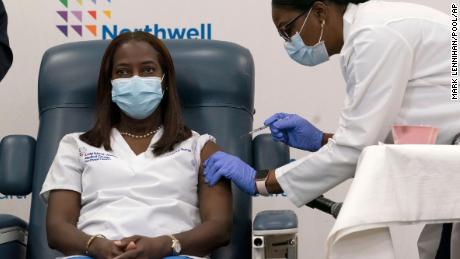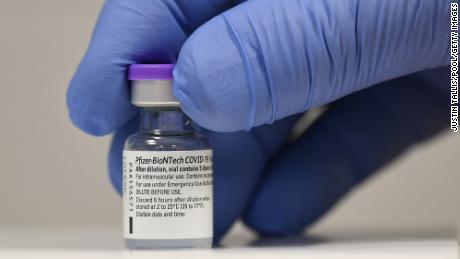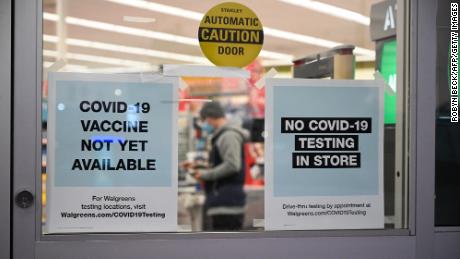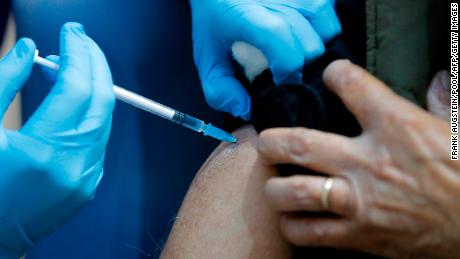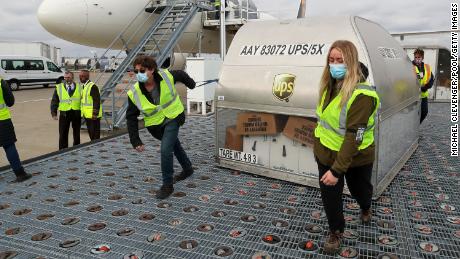US nears 300K coronavirus deaths
In the meantime, thousands of Americans are dying from the virus every day.
Who’s getting the first Covid-19 vaccines
Sandra Lindsay, an ICU nurse at Long Island Jewish Medical Center in Queens was given the shot at 9:20 a.m. ET Monday. She said the shot didn’t feel any different than any other vaccine.
“I’m feeling well. I would like to thank all the frontline workers and all my colleagues … doing their job during this pandemic all over the world,” she said.
“I feel hopeful today, relieved. I hope this marks the beginning of the end of a very painful time.”
The US Food and Drug Administration recently authorized the vaccine for emergency use, and the US Centers for Disease Control and Prevention has allowed it to be given to people 16 and older.
“We expect 145 sites across all the states to receive vaccine on Monday, another 425 sites on Tuesday, and the final 66 sites on Wednesday, which will complete the initial delivery of the Pfizer orders for vaccine,” said Gustave Perna, chief operating officer of Operation Warp Speed.
Each person who receives a vaccine needs two doses, and it’s up to states to allocate their share of vaccines.
But the CDC has recommended that health care workers and residents of long-term care facilities get the vaccine first.
Keeping the vaccines way below freezing
The ultra-cold temperatures required by the Pfizer/BioNTech vaccine is a massive logistical challenge.
The vaccine needs to be stored at about minus 75 degrees Celsius (about minus 94 degrees Fahrenheit). It is diluted and thawed before getting injected into people’s arms.
“The minus-100-degree requirement with dry ice, making sure it moves, making sure the temperature is maintained, making sure the dry ice that follows the shipment after the vaccine arrives, that’s important,”said Wes Wheeler, president of UPS Healthcare.
Wheeler said the command center for UPS is watching every shipment and tracking all packages.
States balance precautions with vaccine distribution
“This is a major milestone for science, our country and our community,” LAX said. “Thank you to all those who made this delivery possible, and are part of the incredible effort to distribute vaccines around the world.”
Like many parts of the US, California is struggling with a massive Covid-19 surge.
More than 90% of California residents are under orders to stay at home, except for essential needs like grocery shopping, banking and medical appointments.
The state issued the stay-at-home order when ICU capacity for the region fell below 15%.
“We are at a critical point,” Sisolak said Sunday., “We will be monitoring and evaluating our current situation day to day and week by week will remain under the current restrictions for now, with the goal of getting through the next month.”
While he did not say exactly when vaccinations would start, Sisolak said plans are in place to distribute the first allocation to frontline health care workers and staff and residents in the nursing facilities for “immediate vaccination.”
In Washington, Gov. Jay Inslee said public vaccinations in his state are expected to begin Tuesday.
An initial 62,000 doses will be distributed to 40 facilities and 29 counties, said Michele Roberts, acting assistant secretary of the Washington Department of Health.
Since the number of available vaccines will be limited for months — and since each person needs two doses of Pfizer/BioNTech vaccine — officials say wearing masks is just as important now as it was last week.
“I want to be clear, this does not change the importance of our safety precautions,” Inslee said.
“Masking, physical distancing and limiting interactions is just as important tomorrow as it was yesterday.”
Americans can’t ‘drop our guard’
The director of the National Institutes of Health warned that even those who get the vaccine should keep wearing masks for the foreseeable future.
“You still need to think of yourself as potentially contagious even though you are protected from getting sick at a very high percentage of certainty,” Dr. Francis Collins told NBC’s “Meet the Press.”
Data shows the Pfizer/BioNTech vaccine is highly effective in preventing people from getting sick with Covid-19, but it’s not yet clear whether people can still carry the virus and infect others.
Collins said it was “an urgent question to discover” and figuring it out will take a couple of months.
“Masks are still going to be part of our life,” he said. “We need to recognize that and not step away or start to drop our guard.”
CNN’s Maggie Fox, Hollie Silverman, Kay Jones, Gregory Wallace, Claudia Dominguez, Chuck Johnston, Jessica Jordan, Kay Jones, Artemis Moshtaghian, Naomi Thomas and Jennifer Selva contributed to this report.
![]()




